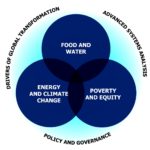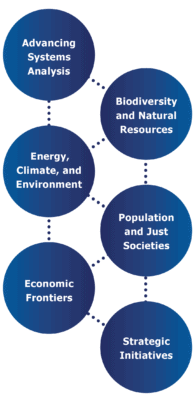Insights and interconnections:
A decade of systems science
A decade of IIASA science has made crucial inroads into these problems and highlighted their profound interconnections as these selected achievements show.
2011
In 2011, IIASA set off on a ten-year strategic plan, aiming to use systems analysis to find solutions to global problems, improve human wellbeing and protect the environment. This effort focused mainly on three problem areas: food and water, energy and climate change, and poverty and equity.
IIASA co-develops and hosts the Representative Concentration Pathways (RCP) database, equipping the climate change research community with common greenhouse gas emissions data.
2012
IIASA and partners identify 14 measures to reduce short-lived climate forcers, providing scientific evidence for the Climate and Clean Air Coalition and its 69 state partners.
IIASA publishes the Global Energy Assessment, the first-ever fully integrated assessment of its kind that goes on to provide the scientific basis and key objectives for the UN Secretary-General’s Sustainable Energy for All initiative.
2013
IIASA and partners launch a revamped Geo Wiki to harness the power of citizen science to collect and verify land cover data, thereby dramatically improving the quality of the data.
IIASA conducts the most comprehensive assessment to date of global livestock production and its role in land use and contribution to climate change.
2014
The European Commission agrees a proposal for new climate and energy targets for 2030 informed by IIASA modeling results.
IIASA research into how to reduce systemic risk in the financial sector identifies policies to restructure inter-bank networks to reduce risk.
2015
The Sustainable Development Goals (SDGs) are formally adopted, with IIASA science underpinning goals on tackling climate change and ensuring access to sustainable energy for all.
IIASA science contributes to talks leading up to the Paris Agreement, providing the only study to show that it was technologically feasible to limit global warming to 1.5°C above pre-industrial levels.
2016
IIASA researchers develop consistent, comprehensive guidance on creating national nitrogen budgets to help avoid trade-offs and allow countries to compare performances and share best practices.
IIASA adopts an open-access publication policy making 73% of peer-reviewed journal articles by IIASA researchers published from 2016-2020 freely available — up from 24% for 2011-2015.
2017
A decade of IIASA demographic research demonstrating why education should be the priority investment for development budgets, informs the German Federal Ministry for Development’s decision to allocate 25% of its entire funding for education.
IIASA convenes dialogs of high-level officials and experts from European and Asian countries, to explore the challenges and opportunities of establishing closer economic relations and an eventual creation of a “common economic space from Lisbon to Vladivostok.”
2018
The Zambezi River Basin Commission develops a strategic plan for water, energy, and food management based on findings from an IIASA-led study.
The Zurich Flood Resilience Alliance renews its partnership with IIASA to apply its research into systemic risks to help render 2 million people around the globe resilient against flooding.
2019
The Chinese Government officially adopts an IIASA model to strengthen air quality management in the country.
2020
IIASA modeling informs European Union Member States on clean air measures that could reduce premature deaths due to air pollution by 55% in 2030 in the European Commission’s Second Clean Air Outlook.
IIASA and partners bring together over 200 experts to define and design sustainability pathways that will enable building-back a more sustainable post COVID-19 world.
2011 - 2020
The quantity of IIASA publications and citations grow rapidly. Between 2011 and 2020, IIASA researchers author 5,450 publications, up from 3,336 in the previous decade, and citations soar from 6,442 in 2011, to 33,619 in 2020.
IIASA develops new tools for systems analysis including pioneering new models, such as an agent-based economic model that can address problems from disaster risk management to migration; integrating models to deal with the complex interrelationships of the food-water-energy nexus; and “serious games”, which provide a simulated real-world environment for experimental interactive learning, dealing for example, with complex problems of public policymaking.
A total of 532 early career scientists have developed their interdisciplinary research skills by taking part in the Young Scientists Summer Program and Postdoctoral Programs.
Expanding IIASA expertise for 2021-2030
Building on the last decade of insights and advances, IIASA is embarking on a new strategy for 2021 to 2030 to become the primary destination for systems solutions to sustainability. Six new, interconnected research programs will combine new expertise and methods with existing IIASA strengths.
Artificial intelligence and machine learning, among other techniques, will be applied to enhance the institute’s toolset of advanced systems methods. Biodiversity research will combine with existing IIASA expertise on land, water, and food to improve our understanding of the intricate nexus of food production, conservation, water security, climate, and disease.
In addition, a new focus on behavioral changes, lifestyles, equity, as well as governance and institutions will strengthen the institute’s capacity to identify pathways to achieve the SDGs, as well as more resilient and just societies that leave nobody behind.


